Review of Ley Lines
Introduction
This is the third and final part of Miike`s `The Black Society Trilogy`.
Takashi Miike is perhaps best known for his relatively recent successes; the internationally revered `Ichi the Killer` and the bizarre psychodrama `Audition`. Somewhat of a maverick, he seemingly `fell` into filmmaking by accident. Initially his work was `straight to video` and in interviews he always professed to having a preference for really good television rather than the movie industry, which he felt, was full of self-aggrandizing dullards. His first theatre release was `Shinjuku Triad Society`, the first part of the trilogy that includes `Rainy Dog` and `Ley Lines`. This first movie met great critical acclaim. He remains incredibly prolific, turning out between four and seven movies per year, straddling many genres, from horror to musical and touching just about everything in-between. Much of his work is punctuated with ultra-violence and very explicit brutality and is certainly not for the squeamish.
`Ley Lines` follows the rich family theme of its predecessors in the trilogy and once again features some ethnically mixed outsiders trying to make good. The movie follows three Japanese-Chinese youths as they search for ways of improving their lot. The `Ley Lines` of the title may well refer to the crossing lines of their mixed ethnicity and geographic origins - and the path they take across these boundaries trying to find a place that they can call their own.
Ryuichi, along with his younger brother Shunrei, gets fed up with life in their rural backwater and decide to head to the mean streets of Tokyo, along with childhood friend Cheng. As naïve country-bumpkins they prove to be easy prey for to the charms of cynical prostitute Anita who leaves them penniless in the big city. To make a yen or two they start dealing in low-grade drugs (inhalant `Toulene`). They need passports to get them off the Japanese Islands to a new life that they imagine awaits them elsewhere and they meet up with ruthless Triad boss Wang to see if they can buy them from him. Ryuichi is beaten to within an inch of his life by Wang`s thugs and the three boys vow to avenge him by stealing his money and leaving the country.
Well, they manage the first part of the plan but leaving the country doesn`t prove to be simple, particularly with the full-force of the Triad gang on their tale.

Video
Presented in 16:9 Anamorphic Wide-Screen, the transfer looks very good indeed. The cinematography is really very accomplished on this third part of the trilogy, with some breath-taking location views.
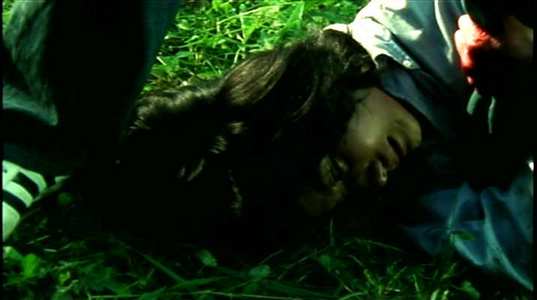
Audio
The Dolby soundtrack is very good. Miike favours much in the way of whispered dialogue - yet there are often moments of extreme shouting too. It all works very well and there`s kittle need to pump the remote to compensate.
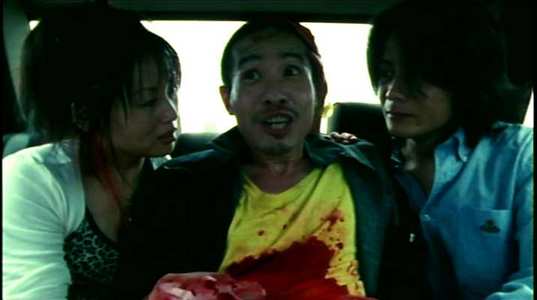
Features
This edition is richly blessed with worthwhile extras.
The Filmographies and Biographies are standard text based but Miike`s (for example) runs to some 19 pages, and are nicely penned.
There are two interviews with Miike. One where he is sitting on a sofa looking every bit like one of the characters in his movies, with sunglasses revealing nothing of his expression. The other is in a white -towelling `dressing gown` and seems to more or less continue where the first left off. Sound is poor on both, and (like in `Lost in Translation`), Miike appears to say much, much more than is registering on the sub-titles though, of course, I can`t be sure. There`s a nice interview with his editor, Yasushi Shimara too. Finally, there`s an audio commentary from Japanese Film expert Tom Mes that sounded very worthwhile but kept sticking for me just after the opening titles.
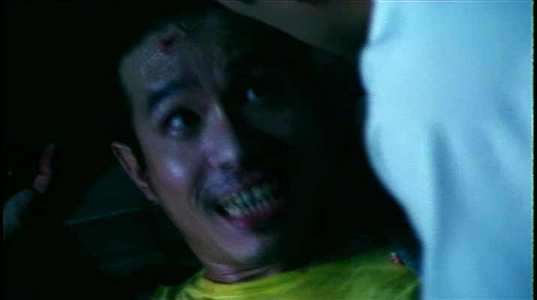
Conclusion
Whilst this isn`t the frenetic roller-coaster ride of the trilogies first movie (Shinjuku Triad Society), this has more than it`s fair share of violence and sex. It`s real strength lies, not in these ingredients (a staple of Miike`s oeuvre), but in the clever characterisation of its principals. Ryuichi is the thoughtful one, quiet yet explosive.
Shunrei more passive and likable, and the cheeky joker, Cheng who lightens even the darkest moments of this movie. It`s certainly not a film for those with sensitive tastes.
But it is a compelling movie that demands to be watched in a single viewing. Start and you won`t be able to stop. Each of the movies in `The Black Society Trilogy` can be viewed independently of the other as they are only linked thematically. This could be as good a start point as any.
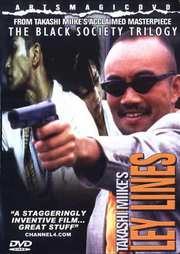
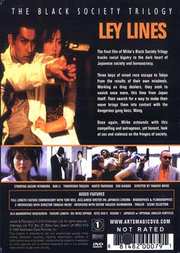












































Your Opinions and Comments
Be the first to post a comment!